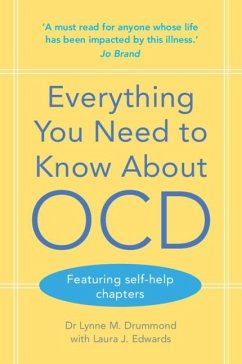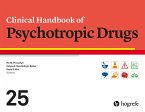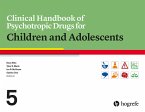12,95 €
12,95 €
inkl. MwSt.
Sofort per Download lieferbar

6 °P sammeln
12,95 €
Als Download kaufen

12,95 €
inkl. MwSt.
Sofort per Download lieferbar

6 °P sammeln
Jetzt verschenken
Alle Infos zum eBook verschenken
12,95 €
inkl. MwSt.
Sofort per Download lieferbar
Alle Infos zum eBook verschenken

6 °P sammeln
- Format: PDF
- Merkliste
- Auf die Merkliste
- Bewerten Bewerten
- Teilen
- Produkt teilen
- Produkterinnerung
- Produkterinnerung

Bitte loggen Sie sich zunächst in Ihr Kundenkonto ein oder registrieren Sie sich bei
bücher.de, um das eBook-Abo tolino select nutzen zu können.
Hier können Sie sich einloggen
Hier können Sie sich einloggen
Sie sind bereits eingeloggt. Klicken Sie auf 2. tolino select Abo, um fortzufahren.

Bitte loggen Sie sich zunächst in Ihr Kundenkonto ein oder registrieren Sie sich bei bücher.de, um das eBook-Abo tolino select nutzen zu können.
An accessible guide for people with OCD and their loved ones, featuring self-help chapters based on Graded Exposure therapy.
- Geräte: PC
- mit Kopierschutz
- eBook Hilfe
- Größe: 4.55MB
- FamilySharing(5)
Andere Kunden interessierten sich auch für
![Epilepsien bei Kindern und Jugendlichen (eBook, PDF) Epilepsien bei Kindern und Jugendlichen (eBook, PDF)]() Axel PanzerEpilepsien bei Kindern und Jugendlichen (eBook, PDF)69,99 €
Axel PanzerEpilepsien bei Kindern und Jugendlichen (eBook, PDF)69,99 €- -23%11
![Pflegewissen Psychopharmaka (eBook, PDF) Pflegewissen Psychopharmaka (eBook, PDF)]() Otto DietmaierPflegewissen Psychopharmaka (eBook, PDF)26,99 €
Otto DietmaierPflegewissen Psychopharmaka (eBook, PDF)26,99 € ![Clinical Handbook of Psychotropic Drugs (eBook, PDF) Clinical Handbook of Psychotropic Drugs (eBook, PDF)]() Clinical Handbook of Psychotropic Drugs (eBook, PDF)74,99 €
Clinical Handbook of Psychotropic Drugs (eBook, PDF)74,99 €![Clinical Handbook of Psychotropic Drugs for Children and Adolescents (eBook, PDF) Clinical Handbook of Psychotropic Drugs for Children and Adolescents (eBook, PDF)]() Clinical Handbook of Psychotropic Drugs for Children and Adolescents (eBook, PDF)74,99 €
Clinical Handbook of Psychotropic Drugs for Children and Adolescents (eBook, PDF)74,99 €- -67%11
![Psychopharmaka als Mittel zur Freiheitsbeschränkung (eBook, PDF) Psychopharmaka als Mittel zur Freiheitsbeschränkung (eBook, PDF)]() Rainer HeidePsychopharmaka als Mittel zur Freiheitsbeschränkung (eBook, PDF)4,99 €
Rainer HeidePsychopharmaka als Mittel zur Freiheitsbeschränkung (eBook, PDF)4,99 € ![Psychopharmakologie und Psychopharmakotherapie kompakt (eBook, PDF) Psychopharmakologie und Psychopharmakotherapie kompakt (eBook, PDF)]() Psychopharmakologie und Psychopharmakotherapie kompakt (eBook, PDF)65,00 €
Psychopharmakologie und Psychopharmakotherapie kompakt (eBook, PDF)65,00 €![Klinische Pharmakologie in der psychotherapeutischen Arbeit (eBook, PDF) Klinische Pharmakologie in der psychotherapeutischen Arbeit (eBook, PDF)]() Klinische Pharmakologie in der psychotherapeutischen Arbeit (eBook, PDF)31,99 €
Klinische Pharmakologie in der psychotherapeutischen Arbeit (eBook, PDF)31,99 €-
-
- -40%11
An accessible guide for people with OCD and their loved ones, featuring self-help chapters based on Graded Exposure therapy.
Dieser Download kann aus rechtlichen Gründen nur mit Rechnungsadresse in A, B, BG, CY, CZ, D, DK, EW, E, FIN, F, GR, HR, H, IRL, I, LT, L, LR, M, NL, PL, P, R, S, SLO, SK ausgeliefert werden.
Produktdetails
- Produktdetails
- Verlag: Cambridge University Press
- Erscheinungstermin: 23. Juni 2022
- Englisch
- ISBN-13: 9781009019248
- Artikelnr.: 70908397
- Verlag: Cambridge University Press
- Erscheinungstermin: 23. Juni 2022
- Englisch
- ISBN-13: 9781009019248
- Artikelnr.: 70908397
- Herstellerkennzeichnung Die Herstellerinformationen sind derzeit nicht verfügbar.
Dr Lynne Drummond is an internationally renowned psychiatrist and researcher, who has been helping people with OCD for over 40 years. In addition to her roles as Honorary Consultant and Visiting Professor, Dr Drummond also works extensively with various charities who offer help to people with OCD and their families, such as Triumph Over OCD and Phobias UK (TOP UK), OCD Action and OCD UK. Everything You Need to Know About OCD is her fourth book.
Preface
1. What Is OCD and Is It Really a Problem?
2. Who Gets OCD and How Would Anyone Know If They Had It?
3. Types and Presentation of OCD
4. Drug Treatment
5. Exposure and Response Prevention for OCD
6. Children and Adolescents with OCD
7. Old Treatments, Modern Developments, New Research, and Potential Treatments for the Future
8. Other Conditions Which Appear Similar to OCD
9. What Can Family and Carers Do to Help a Person with OCD
10. What can you do to help cope with your OCD?
11. General Principles of Treatment
12. How to Better Manage Your Symptoms Before and During Treatment
13. Overcoming Fears of Contamination
14. Fear of harm to self or others due to failure to act appropriately (fear of harm through an act of omission) and trying to obtain the 'just right' feeling and doubting the memory
15. Fear of harm to self or others due to your own actions (or thoughts)
16. Overcoming 'Taboo' Obsessive Thoughts
17. Loss of something (objects or part of 'self')
18. Overcoming Obsessive-Compulsive Slowness, Perfectionism and Symmetry
19. Overcoming Obsessive Ruminations (Sometimes known as Pure 'O')
20. When the treatment doesn't go according to plan or even if it does, what to do next
Glossary
Resources
References.
1. What Is OCD and Is It Really a Problem?
2. Who Gets OCD and How Would Anyone Know If They Had It?
3. Types and Presentation of OCD
4. Drug Treatment
5. Exposure and Response Prevention for OCD
6. Children and Adolescents with OCD
7. Old Treatments, Modern Developments, New Research, and Potential Treatments for the Future
8. Other Conditions Which Appear Similar to OCD
9. What Can Family and Carers Do to Help a Person with OCD
10. What can you do to help cope with your OCD?
11. General Principles of Treatment
12. How to Better Manage Your Symptoms Before and During Treatment
13. Overcoming Fears of Contamination
14. Fear of harm to self or others due to failure to act appropriately (fear of harm through an act of omission) and trying to obtain the 'just right' feeling and doubting the memory
15. Fear of harm to self or others due to your own actions (or thoughts)
16. Overcoming 'Taboo' Obsessive Thoughts
17. Loss of something (objects or part of 'self')
18. Overcoming Obsessive-Compulsive Slowness, Perfectionism and Symmetry
19. Overcoming Obsessive Ruminations (Sometimes known as Pure 'O')
20. When the treatment doesn't go according to plan or even if it does, what to do next
Glossary
Resources
References.
Preface
1. What Is OCD and Is It Really a Problem?
2. Who Gets OCD and How Would Anyone Know If They Had It?
3. Types and Presentation of OCD
4. Drug Treatment
5. Exposure and Response Prevention for OCD
6. Children and Adolescents with OCD
7. Old Treatments, Modern Developments, New Research, and Potential Treatments for the Future
8. Other Conditions Which Appear Similar to OCD
9. What Can Family and Carers Do to Help a Person with OCD
10. What can you do to help cope with your OCD?
11. General Principles of Treatment
12. How to Better Manage Your Symptoms Before and During Treatment
13. Overcoming Fears of Contamination
14. Fear of harm to self or others due to failure to act appropriately (fear of harm through an act of omission) and trying to obtain the 'just right' feeling and doubting the memory
15. Fear of harm to self or others due to your own actions (or thoughts)
16. Overcoming 'Taboo' Obsessive Thoughts
17. Loss of something (objects or part of 'self')
18. Overcoming Obsessive-Compulsive Slowness, Perfectionism and Symmetry
19. Overcoming Obsessive Ruminations (Sometimes known as Pure 'O')
20. When the treatment doesn't go according to plan or even if it does, what to do next
Glossary
Resources
References.
1. What Is OCD and Is It Really a Problem?
2. Who Gets OCD and How Would Anyone Know If They Had It?
3. Types and Presentation of OCD
4. Drug Treatment
5. Exposure and Response Prevention for OCD
6. Children and Adolescents with OCD
7. Old Treatments, Modern Developments, New Research, and Potential Treatments for the Future
8. Other Conditions Which Appear Similar to OCD
9. What Can Family and Carers Do to Help a Person with OCD
10. What can you do to help cope with your OCD?
11. General Principles of Treatment
12. How to Better Manage Your Symptoms Before and During Treatment
13. Overcoming Fears of Contamination
14. Fear of harm to self or others due to failure to act appropriately (fear of harm through an act of omission) and trying to obtain the 'just right' feeling and doubting the memory
15. Fear of harm to self or others due to your own actions (or thoughts)
16. Overcoming 'Taboo' Obsessive Thoughts
17. Loss of something (objects or part of 'self')
18. Overcoming Obsessive-Compulsive Slowness, Perfectionism and Symmetry
19. Overcoming Obsessive Ruminations (Sometimes known as Pure 'O')
20. When the treatment doesn't go according to plan or even if it does, what to do next
Glossary
Resources
References.







